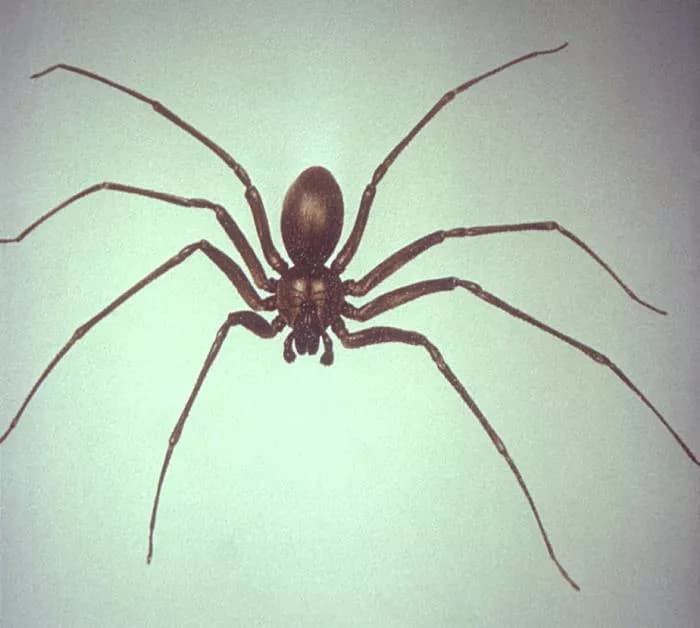What are the other Names for this Condition? (Also known as/Synonyms)
- Loxosceles Reclusa Bite
- Poisoning by Brown Recluse Spider Bite
- Poisoning due to Brown Recluse Spider Venom (Disorder)
What is Brown Recluse Spider Bite? (Definition/Background Information)
- The brown recluse spider is a poisonous spider that is native to certain regions of the United States. This spider is half an inch long in size with distinct, dark, violin-shaped marks on its head and body. Any individual bitten by the spider should seek immediate medical attention
- People living in Eastern Texas, Missouri, Kansas, and Louisiana are at an increased risk of being exposed to brown recluse spiders. These spiders release a small amount of poisonous venom into the skin when they bite. The venom is extremely toxic; more potent than the venom of a rattlesnake
- A few signs and symptoms associated with Brown Recluse Spider Bites include formation of a red to purple area around the bite, itching, fever, chills, and fatigue. Possible complications that arise from the bite include kidney failure, seizures, and coma
- Treatment of a Brown Recluse Spider Bite include elevating the bitten area, applying cold compresses, limiting one’s physical activities for a period of time, and pain medications such as acetaminophen and antihistamines for itching. The prognosis is generally good with suitable and timely treatment
Who gets Brown Recluse Spider Bite? (Age and Sex Distribution)
- Any individual, adult or child, may be bitten by the brown recluse spider
- The south and central states of the US are regions where brown recluse spiders are most commonly found
What are the Risk Factors for Brown Recluse Spider Bite? (Predisposing Factors)
Risk factors associated with Brown Recluse Spider Bites include being in the endemic regions and:
- Being in a wooded, dry, and/or dark area
- Not wearing protective clothing in high risk areas
Living in areas (such as Eastern Texas, Missouri, Kansas, and Louisiana) where these spiders are common is a potential risk factor.
It is important to note that having a risk factor does not mean that one will get the condition. A risk factor increases ones chances of getting a condition compared to an individual without the risk factors. Some risk factors are more important than others.
Also, not having a risk factor does not mean that an individual will not get the condition. It is always important to discuss the effect of risk factors with your healthcare provider.
What are the Causes of Brown Recluse Spider Bite? (Etiology)
- Brown Recluse Spider Bites release a small amount of poisonous venom into the skin. This venom is extremely toxic and causes severe damage to the skin and tissues
- This spider venom is a compilation of enzymes that destroy cell membranes and tissues. It will eventually cause the tissue around the bite to die, as the blood vessels are obliterated
What are the Signs and Symptoms of Brown Recluse Spider Bite?
After the spider bite occurs, pain will generally be felt within several hours. The signs and symptoms of a Brown Recluse Spider Bite include:
- Fever, chills, and sweating
- Fatigue, nausea
- Visible red to purple area around the bite
- Ulceration around the site of the bite; sometimes, the ulcerations are extensive
- Itching
- Children may have more severe reactions from the poison in their body.
How is Brown Recluse Spider Bite Diagnosed?
Diagnosis of Brown Recluse Spider Bite includes:
- Brown Recluse Spider Bites are diagnosed primarily through physical examination. A physician shall examine the site of the bite and ask about relevant clinical information
- There is no definitive test used to confirm a Brown Recluse Spider Bite. A visual identification of the spider is helpful
- However, when symptoms have become widespread, in rare cases, lab tests can be done. These tests may include:
- Urinalysis
- Complete blood count
- Blood clotting study
- Kidney function test
Many clinical conditions may have similar signs and symptoms. Your healthcare provider may perform additional tests to rule out other clinical conditions to arrive at a definitive diagnosis.
What are the possible Complications of Brown Recluse Spider Bite?
In rare cases, a Brown Recluse Spider Bite may result in:
- Kidney failure
- Seizures
- Jaundice
- Coma
How is Brown Recluse Spider Bite Treated?
There is no specific antidote for the brown recluse spider venom; treatment is directed towards the management of symptoms caused by the bite. The treatment plan may include:
- Elevating the bitten area
- Cold compresses
- Limiting physical activity
- Use of pain medication (acetaminophen, ibuprofen, and naproxen)
- Antihistamines for itching
- Antibiotics for infection
- Removal of dead skin around ulcers
- Skin grafts (if ulcers are extensive)
How can Brown Recluse Spider Bite be Prevented?
Wearing protective clothing in wooded areas, specifically in areas where brown recluse spiders are common, can help prevent bites.
What is the Prognosis of Brown Recluse Spider Bite? (Outcomes/Resolutions)
- The prognosis associated with a Brown Recluse Spider Bite is generally good
- Survival after 48 hours is usually an indication that recovery will take place
- Death from a Brown Recluse Spider Bite is infrequent, but may occur in children
Additional and Relevant Useful Information for Brown Recluse Spider Bite:
- The brown recluse spider is also known as the fiddleback spider, or scientifically termed Loxosceles reclusa
- In case of poisoning, please contact your local Poison Control Center immediately
- Poisoning occurs when you are exposed to a harmful substance that can cause a wide spectrum of damage to the health. It may even lead to death
The following article link will help you with First Aid information on poisoning:
Related Articles
Test Your Knowledge
Asked by users
Related Centers
Related Specialties
Related Physicians
Related Procedures
Related Resources
Join DoveHubs
and connect with fellow professionals


0 Comments
Please log in to post a comment.